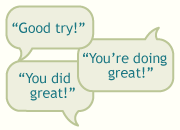Encourage the child
Did you know?
Support and encouragement can go a long way in inspiring a child to have a go at a new skill or challenge.
When a child attempts or achieves a new skill, it needs to be identified - not only to the individual but also to others. This encourages sharing of information and useful communication skills for later in life.
More importantly; it develops a child's sense of pride, which encourages future attempts at new challenges for one's own sake rather than trying new challenges for reward from an external source.
Verbally encouraging the child
When using task analyses, you need to do more than physically show and guide children. You will need to use verbal encouragement, speaking to the children with respect and consideration.
It's important to encourage children as they learn new skills, even if their attempts are not always successful. Whenever a child is making an effort toward the new task, whether they master it or not, they should be encouraged.
Imagine that you are just learning how to dress yourself.
You get up enthusiastically from your afternoon rest and pick up your shirt ready to put it on. You manage to get both arms through the correct sleeves and proudly do up the buttons. You're really excited that you've managed to put on your shirt all by yourself!
Then your caregiver comes in and says, 'You've buttoned up your shirt all wrong! Look, you've missed a button.'
Imagine having your enthusiasm for learning crushed by a careless remark like that... how would you feel?
Read the following scenario and answer the questions. Keep a copy of your answers in your notebook.
Jane (2 years old) is running towards the toilet holding her crotch. She pulls down her pants and sits on the small child size toilet. When she's finished urinating she gets down and discovers that her knickers are wet because she didn't pull them down far enough. She begins to cry.
- What feelings might Jane be having?
- What could you say to encourage Jane's developing independence?
Responding to and supporting children's attempts

Support needs to be offered in the same way as encouragement, as in some ways it is a form of encouragement. Support and encouragement can go a long way in inspiring a child to have a go at a new skill or challenge. If someone is continually acknowledging your efforts and attempts, you feel more confident about having a go without worrying about having to always be successful.
Have you ever been on a camp, sports day or group activity where you have undertaken a challenge that you wouldn't normally have because you were inspired by another's achievements?
When giving encouragement and support you should always speak with respect and display a courteous and caring nature. You may find that you display these qualities easily with your friends, however you might not find it quite as easy when working with children.
Below is a document containing ten attempts at various self-help skills by children of different ages. Have a go at supporting these children's attempts and learning respectfully.
Open the document and save or print a copy. Write or type your answer for each scenario into the document. The first example is completed for you.
Encouraging children to attempt self help skills (Word 64Kb)




